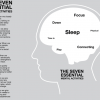Hey there ZenFood, I exactly parallel your experiences & struggles with ADHD (or whatever might be effecting us), and I was just wondering how your quest is going? My symptoms and experiences are identical to your posts, but I don't know where to start with getting back on track!
How are you feeling since your last post?
Hey!
I would say that I am cured. I'm not depressed anymore and my libido is very high. I laugh to trivial things and I just enjoy life. I also find meditation to be quite easy. I have started reading books again and I can focus (Meditation/Reading/Dual N'back/Whatever is important for increased BDNF levels and memory in general. I think that it doesn't matter what you focus on. You could probably play Guitar Hero and get the same effect, as long as you do some long extended uninterrupted focus training. However meditation is king, because it has other beneficial things to it, as lowered inflammation and it balances the body). I just feel normal and mentally stable. The foggy cloud is gone.
A zinc and/or magnesium deficiency = increased levels of IL-6 and IL-1b. With increased IL-1b levels in the brain, you get major ADHD... and there are very few things that penetrates the blood brain barrier and are able to decrease IL-1b. With increased IL-6 one usually experiences joint pain (rheumatoid arthritis) and brain fog.
So I've been taking 4x L-OptiZinc (Now Foods) for a long time now each day and I am sure that it has been the most important thing for me. Also training hard at the gym really depletes zinc from the body. Another thing I noticed was that methylphenidate depletes zinc... so it's no wonder that it made me worse over time.
Best things that have worked for me to reduce inflammation (both IL-1b and IL-6) in the brain and increasing BDNF (IL-1b actually reduces BDNF and acetylcholine levels, which hampers memory big time, which actually could be the main cause for ADHD) has been a combination of things. Every single thing that I list below decreases IL-6 and IL-1b and penetrates the blood brain barrier.
OK. So since I started inhibiting IL-1b I have noticed that my memory has gotten significantly better. My memory was terrible and it made me depressed (I mean really down, scared and worried about my future. My grandma at the age of 82 still beats me on memory games). I think the best things has been:
– Foods that have a low or medium glycemic index. IL-1b also inhibits insulin release in response to glucose. Eventually one gets higher blood glucose levels. Lowering blood glucose or speeding up metabolism, raises BDNF, and more BDNF increases metabolism.
– At least 35g of blueberries mixed with 3g of cinnamon daily in my porridge consisting of gluten free oats (oat polyphenols, beta-glucans and phytic acid also decreases IL-1b and IL-6)
– High dosages of L-OptiZinc (Now Foods)
There are also others that I notice INSTANT effect from that allows me to think much clearer and makes me really optimistic:
– Aerobic exercise or walking with a really fast pace (bodybuilding or powerlifting doesn’t count)
– 300 mg of L-Theanine twice a day. It shuts off the inflammation acutely. All shatter disappears from my head.
– 200 mg of Huperzine A once daily (really potent, only to be taken 3 times a week) makes me really sharp. Potent anti-inflammatory and the increased acetylcholine levels are a nice addon.
– Acetaminophen / Paracetamol a.k.a. Tylenol or Panodil. I have taken this multiple times a day. Usually around 3 g. Hepatotoxicity happens around 4 g. (Yes, it lowers both IL-6 and IL-1beta:http://bit.ly/1HchbpW )
And then we have Omega-3 (1000 mg of DHA/day), something I have had faith in, but never noticed anything from. The DHA capsules from Now Foods, without the usual vitamin A, doesn’t give me any brain fog. So those who experience brain fog from cod liver oil, most likely has too much vitamin A flooding in their system.
Life Extension's One Per Day has also been a part of my daily regimen. It feels that I cover all angles with it. I also take 10,000 IU of vitamin D and 550mg of pure magnesium (in the form of magnesium malate) before bed. I eat lots of steamed spinach too for additional magnesium.
1500 mg of Niacinamide timed release is also a great tool that reduces both of these interleukins and also penetrates the BBB. However I take it sparingly, because some people have experienced liver damage with it. I would advice you to eat frequently and have a full stomach while taking this for ~8 hours.
ALCAR should work in theory. But it makes my jaws clench and I get anxiety, big time. Even with really low doses. Straight L-Carnitine doesn't give me this effect and ALCAR/L-Carnitine reduces IL-1b and IL-6. So some people might find these useful.
P.S.
If you are depressed, feel overwhelmed and you just don't have enough energy to take care of yourself: Take 50mg of modafinil (more than this gives me anxiety) and you will be able to cope with life.
Edited by Zenfood, 12 May 2015 - 01:23 PM.





























































